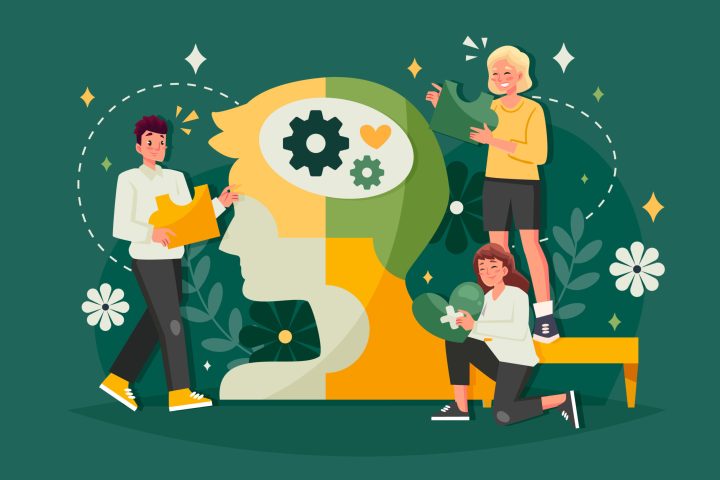Eating disorders are serious health conditions. They affect both body and mind.
Many people struggle with food and body image issues. It’s not always clear if you have an eating disorder. Taking a test can help you understand more about your relationship with food. This test can guide you to seek professional help if needed.
Early detection is key. It can lead to better treatment and recovery. Recognizing the signs can make a big difference. This blog will explain how to take a test. It will also help you understand the results. Let’s start the journey to better health and self-awareness.
Topic of Contents
ToggleRecognizing Eating Disorders
Understanding eating disorders is vital for early intervention and treatment. Eating disorders affect many people. Recognizing the signs can help you or someone you care about. Let’s explore common types and their prevalence.
Common Types
There are several types of eating disorders. Knowing them helps in recognizing symptoms:
- Anorexia Nervosa: Extreme fear of gaining weight. People eat very little.
- Bulimia Nervosa: Binge eating followed by purging. This means vomiting or using laxatives.
- Binge Eating Disorder: Eating large amounts of food. People feel out of control.
- Avoidant/Restrictive Food Intake Disorder (ARFID): Limited eating. People avoid certain foods due to texture or smell.
Prevalence
Eating disorders are more common than you think. Studies show that:
| Disorder | Prevalence |
|---|---|
| Anorexia Nervosa | 0.9% of women and 0.3% of men |
| Bulimia Nervosa | 1.5% of women and 0.5% of men |
| Binge Eating Disorder | 3.5% of women and 2.0% of men |
| ARFID | Unknown, but growing awareness |
Early detection is key. If you recognize these signs, seek help. Talk to a healthcare provider.
Physical Symptoms
Recognizing the physical symptoms of an eating disorder is crucial. These symptoms can affect your health and well-being. Below, we explore some key physical signs.
Weight Fluctuations
One common sign is weight fluctuations. This can mean rapid weight loss or gain. The changes are often noticeable and concerning. Sudden weight shifts can impact your energy and mood.
- Unexplained weight loss
- Frequent weight gain
- Difficulty maintaining a stable weight
Digestive Issues
Digestive issues are another red flag. These may include bloating, constipation, and stomach pain. Digestive problems can make eating uncomfortable. They also disrupt your daily activities.
| Symptom | Description |
|---|---|
| Bloating | Feeling full and tight in the abdomen |
| Constipation | Infrequent or difficult bowel movements |
| Stomach Pain | Persistent pain or discomfort in the stomach area |
These physical symptoms should not be ignored. They could indicate a deeper issue related to an eating disorder.
Behavioral Indicators
Recognizing the behavioral indicators of an eating disorder can be challenging. These signs often reveal themselves through changes in behavior around food and eating habits. Here, we will explore two critical areas: food obsession and eating rituals.
Food Obsession
People with eating disorders may become obsessed with food. This obsession can manifest in several ways:
- Constantly thinking about food, meals, or calories.
- Spending excessive time planning meals.
- Reading about diets and nutrition frequently.
- Feeling anxious or guilty after eating certain foods.
These behaviors can disrupt daily life and cause emotional stress. If you notice these signs in yourself or others, it could indicate an eating disorder.
Eating Rituals
Eating rituals are specific routines or habits around food that may seem odd to others. Some common eating rituals include:
- Cutting food into tiny pieces.
- Eating foods in a specific order.
- Avoiding eating in front of others.
- Consuming meals at the exact same time each day.
These rituals often help individuals feel in control. But they can also be a sign of an underlying problem.
Emotional Signs
Understanding the emotional signs of an eating disorder is crucial. It helps in identifying the problem early. Emotional signs can range from anxiety around food to body image issues. Being aware of these signs can guide you to seek the necessary help.
Anxiety Around Food
Do you feel anxious when you think about eating? This could be a sign of an eating disorder. Many people with eating disorders experience intense anxiety around food. They may worry about what they eat, how much they eat, and the calories in their meals. This anxiety can make meals stressful. Here are some common behaviors:
- Overthinking meal choices
- Feeling guilty after eating
- Avoiding social events with food
These behaviors can disrupt daily life. Recognizing them early can make a big difference.
Body Image Issues
Body image issues are another major emotional sign. People with eating disorders often have a distorted view of their bodies. They may feel overweight even if they are underweight. Signs of body image issues include:
- Constantly checking the mirror
- Comparing oneself to others
- Obsessing over weight and shape
These thoughts can consume a person’s mind. It can lead to unhealthy eating habits and further emotional distress. Recognizing these emotional signs is the first step. It can help you understand if you need to take an eating disorder test. Early identification can lead to better outcomes.
Social Symptoms
Eating disorders have various social symptoms. These symptoms can affect how you interact with others. Recognizing these signs can help identify if you or someone else needs help.
Isolation
One major sign is isolation. People with eating disorders often withdraw from social activities. They might feel ashamed or anxious about their eating habits. This leads them to avoid events where food is present. They may also spend more time alone. This can further increase feelings of loneliness and depression.
Avoidance Of Meals
Avoiding meals with others is another key symptom. People with eating disorders often find excuses to skip meals. They might claim they already ate or are not hungry. This behavior helps them hide their eating problems. In social settings, they may push food around their plate without eating. They might also choose to eat alone. This ensures no one notices their eating habits.
Mental Health Impact
Eating disorders affect both the body and the mind. They can cause serious mental health issues. Understanding these impacts helps in seeking timely help.
Depression
Many people with eating disorders experience depression. They may feel sad, empty, or hopeless. This makes daily activities feel overwhelming. Low self-esteem and guilt often accompany depression. These feelings can worsen the eating disorder. Lack of energy and sleep problems are common. Seeking professional support is important.
Ocd Tendencies
Obsessive-Compulsive Disorder (OCD) tendencies are also seen. Individuals may have repetitive thoughts about food. They might engage in ritualistic behaviors. These behaviors can become time-consuming and distressing. Checking calorie counts or weighing food often are examples. OCD tendencies can reinforce unhealthy eating patterns. Therapy can help manage these symptoms.
Self-assessment Tools
Understanding if you have an eating disorder can be daunting. Self-assessment tools help you get a clearer picture. They are a starting point. You can use these tools to get initial insights into your behavior and feelings. This section will cover two major self-assessment methods: Online Tests and Professional Evaluations.
Online Tests
Online tests are convenient and easy to access. Many websites offer quizzes to help you self-assess. These tests often consist of questions about your eating habits, body image, and emotions. They give a quick overview of your situation. Pros of Online Tests:
- Immediate results
- Accessible from anywhere
- Usually free
Cons of Online Tests:
- May not be accurate
- Not a substitute for professional help
Professional Evaluations
Professional evaluations are more reliable. A doctor or therapist can provide a thorough assessment. They use clinical methods to understand your condition. This approach often involves interviews and standardized questionnaires. Steps in Professional Evaluations:
- Initial consultation
- Physical examination
- Psychological assessment
- Feedback and diagnosis
Benefits of Professional Evaluations:
- Accurate diagnosis
- Personalized treatment plans
- Access to comprehensive care
| Comparison | Online Tests | Professional Evaluations |
|---|---|---|
| Cost | Usually free | Can be expensive |
| Time | Quick | May take multiple sessions |
| Accuracy | Varies | High |
| Follow-up | None | Comprehensive support |
Seeking Help
If you suspect you might have an eating disorder, taking the first step towards seeking help can be challenging. Understanding your options and finding the right support can make a big difference in your recovery journey. Seeking help is crucial for your health and well-being.
Therapy Options
Therapy can be a powerful tool in addressing eating disorders. There are various types of therapies that can help, including:
| Type of Therapy | Description |
|---|---|
| Cognitive Behavioral Therapy (CBT) | This therapy helps change negative thought patterns. |
| Dialectical Behavior Therapy (DBT) | DBT focuses on emotional regulation and mindfulness. |
| Family-Based Therapy (FBT) | FBT involves family members in the treatment process. |
| Interpersonal Psychotherapy (IPT) | IPT addresses issues in personal relationships. |
Support Groups
Support groups offer a sense of community and understanding. Connecting with others who share similar experiences can be comforting. Here are some benefits of joining a support group:
- Emotional support from people who understand your struggles.
- Shared experiences and coping strategies.
- A safe space to express your feelings.
- Motivation and encouragement from peers.
Support groups can be found in person or online, making it easier to find one that fits your needs. Being part of a group can help you feel less isolated and more hopeful.
Preventive Measures
Preventive measures can help you avoid developing an eating disorder. These actions focus on promoting healthy habits and building self-esteem. By practicing these behaviors, you can create a balanced relationship with food and your body.
Healthy Habits
Adopting healthy habits is essential. It involves making mindful choices about food and physical activity. Here are some tips:
- Eat a variety of foods from all food groups.
- Aim for regular meals and snacks.
- Stay hydrated by drinking plenty of water.
- Engage in physical activities you enjoy.
- Avoid using food as a way to cope with emotions.
These habits can help you maintain a healthy body and mind.
Building Self-esteem
Building self-esteem can protect you from negative thoughts about your body. Consider these steps:
- Practice self-compassion and avoid self-criticism.
- Focus on your strengths and achievements.
- Surround yourself with supportive people.
- Limit exposure to unrealistic body images in media.
- Seek professional help if needed.
Strong self-esteem can help you appreciate your body and its abilities. Incorporating these preventive measures can create a positive impact on your well-being.
Frequently Asked Questions
What Are Common Signs Of An Eating Disorder?
Common signs include extreme weight changes, food obsession, and eating in secret. Emotional distress is also a key sign.
How Can I Take An Eating Disorder Test?
Online quizzes and professional consultations can help. Seek a licensed therapist for an accurate diagnosis.
Why Is Early Detection Of Eating Disorders Important?
Early detection helps prevent serious health issues. It also increases the chances of successful recovery.
Can Eating Disorders Affect Mental Health?
Yes, eating disorders often lead to anxiety, depression, and low self-esteem. Mental health support is crucial.
Conclusion
Recognizing an eating disorder early can lead to better outcomes. Pay attention to your body and mind. Seek professional help if needed. This can make a huge difference. Remember, you are not alone. Many people face similar struggles. Take the first step towards a healthier you.
Your journey to recovery is important. Make that call today.







